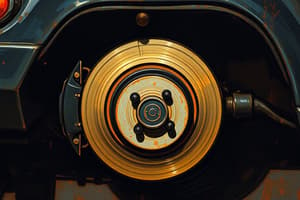Podcast
Questions and Answers
What does the air compressor governor control?
What does the air compressor governor control?
- Air pressure applied to the brakes.
- When air is pumped into the air tanks. (correct)
- The speed of the air compressor.
What is the first thing to do when a low air pressure warning comes on?
What is the first thing to do when a low air pressure warning comes on?
- Stop and safely park as soon as possible. (correct)
- Adjust the brake pedal for more travel.
- Up shift.
What must air brake equipped vehicles have?
What must air brake equipped vehicles have?
- An air use gauge.
- At least two brake heaters.
- A supply pressure gauge. (correct)
What are the three different systems that modern air brake systems combine?
What are the three different systems that modern air brake systems combine?
When making an emergency stop, how should you brake?
When making an emergency stop, how should you brake?
The driver must be able to see a warning before air pressure in the service air tanks falls below what level?
The driver must be able to see a warning before air pressure in the service air tanks falls below what level?
What is the most common type of foundation brakes found on heavy vehicles?
What is the most common type of foundation brakes found on heavy vehicles?
When driving down a long steep hill you should:
When driving down a long steep hill you should:
What is the modulating control valve?
What is the modulating control valve?
What will be true about your brake function if your antilock braking system (ABS) fails?
What will be true about your brake function if your antilock braking system (ABS) fails?
Which of the following is not part of the braking process when driving a vehicle with ABS?
Which of the following is not part of the braking process when driving a vehicle with ABS?
How can you tell if your vehicle is equipped with an antilock braking system (ABS)?
How can you tell if your vehicle is equipped with an antilock braking system (ABS)?
In the event of a brake system failure, the emergency brake system uses __________ to stop the vehicle.
In the event of a brake system failure, the emergency brake system uses __________ to stop the vehicle.
What can happen if you repeatedly press and release the brake pedal?
What can happen if you repeatedly press and release the brake pedal?
When should you push the brake pedal if the spring brakes are on?
When should you push the brake pedal if the spring brakes are on?
How can you tell your brakes are fading?
How can you tell your brakes are fading?
What is required for a converter dolly with antilock brakes (ABS)?
What is required for a converter dolly with antilock brakes (ABS)?
What is the most important thing about hard braking?
What is the most important thing about hard braking?
In controlled braking, you:
In controlled braking, you:
What could happen if oil and water collects in the air tanks?
What could happen if oil and water collects in the air tanks?
Why is the S-cam called an 'S-cam'?
Why is the S-cam called an 'S-cam'?
To test the air service brakes, you should:
To test the air service brakes, you should:
When can you leave your truck unattended without applying parking brakes?
When can you leave your truck unattended without applying parking brakes?
Flashcards are hidden until you start studying
Study Notes
Air Compressor Governor
- Controls the air compressor's speed and the pressure applied to brakes.
- Initiates air pumping into storage tanks when pressure drops to 100 psi and stops at 125 psi.
Low Air Pressure Warning
- Immediate action: stop and safely park the vehicle when the low air pressure warning activates.
Air Brake Requirements
- Vehicles with air brakes must have a supply pressure gauge connected to the air tank.
- Dual air brake systems have individual gauges for each half.
Modern Air Brake Systems
- Comprises three systems: service brakes, parking brakes, and emergency brakes.
Emergency Stopping Technique
- Maintain a straight line and ability to steer while braking.
- Controlled braking or stab braking methods are recommended.
Low Air Pressure Warning Threshold
- Warning devices activate before pressure drops below 60 psi.
Common Foundation Brakes
- The prevalent type of brakes in heavy vehicles is the S-cam brake.
Braking Down Steep Hills
- Use the snub braking method and release brakes when speed is 5 mph below the safe speed.
Modulating Control Valve
- A spring-loaded valve for gradual application of spring brakes if service brakes fail.
Absence of ABS
- Normal brake function persists if the antilock braking system (ABS) fails; repairs are recommended.
Braking Process with ABS
- Maintain consistent braking methods irrespective of the vehicle type with ABS.
Dual Air Brake Systems
- Consist of two separate systems for front and rear axles, utilizing a single brake control.
Identifying ABS
- Vehicles built after March 1, 1998, are mandated to have antilock brakes.
Function of Spring Brakes
- Operate automatically at low psi levels and are powered by strong springs released by air pressure.
Emergency Brake System Operation
- Utilizes components from both service and parking brake systems during a brake failure.
Effects of Repeated Brake Pedal Pressing
- Fanning the brake pedal can lead to a loss of brake air pressure due to inadequate replenishment by the compressor.
Spring Brakes Engagement
- Never push the brake pedal when spring brakes are applied to avoid damage.
Indicators of Fading Brakes
- Pressing the brake pedal harder than usual indicates fading brakes typically due to overheating.
Converter Dolly Requirements
- A yellow lamp is required on the left side for antilock brake-equipped converter dollies manufactured after March 1, 1998.
Hard Braking Essentials
- Avoid locking the wheels for extended periods to maintain vehicle control during emergency braking.
Controlled Braking Technique
- Brake in a straight line without locking wheels, applying firm but controlled force.
Air Tank Contaminants Impact
- Accumulation of oil and water in air tanks can cause brake failure.
S-Cam Brake Design
- Named for its S-shaped configuration which helps push brake shoes against the drum.
Testing Air Service Brakes
- To test, gently apply brakes while moving forward to ensure vehicle stops without pulling to either side.
Unattended Vehicle Protocol
- Never leave a vehicle unattended without engaging parking brakes or chocking wheels to prevent rolling.
Studying That Suits You
Use AI to generate personalized quizzes and flashcards to suit your learning preferences.




